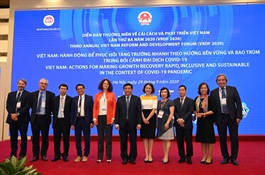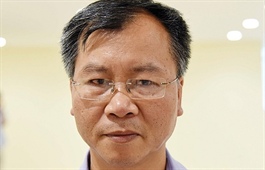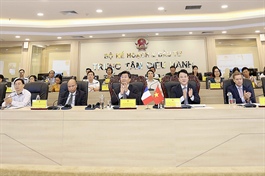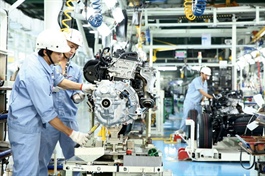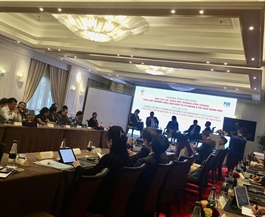State reform values to aid sustainability
State reform values to aid sustainability
Amid the health crisis, Vietnam is boosting economic and policy reforms for sustainable development. Nguyen Dinh Cung, member of the Advisory Group of the government, talked about the importance of such reforms and what they require for success.
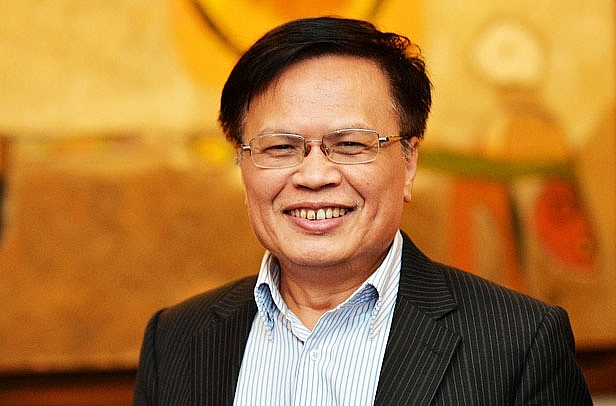
Nguyen Dinh Cung, member of the Advisory Group of the Government
|
What role has government reforms been playing in Vietnam’s development?
Reforms, by nature, aim to create a larger space for the market to operate better, with people given freedom to conduct business. Reform also means a remarkable reduction of state participation in the market, with the state’s functions and tasks to be changed in line with its relationship to the market.
Vietnam began its doi moi reforms in 1986 and the state’s management role was changed in 1988 as the first milestone. At that time, farmer households were allowed to sell their products to the state at market price.
The second milestone change in the role of the state was in 1989-1992, following skyrocketing inflation that even exceeded 700 per cent in 1985. At that time, the high inflation was ascribed to shortages of goods and the solution was printing more money to boost production.
However, on second thought, the state realised that inflation control and macroeconomic stability must not be pursued by boosting supply. The solution was yet another metamorphosis of the state’s role as a demand-side actor. Afterwards, the state must use tools – such as interest rates – to regulate the market based on market principles. This meant that expenses had to be a function of revenue.
As a result, inflation was reduced thanks to effective fiscal and monetary policies.
Moreover, the state also changed its role by dissolving all state-owned enterprises (SOEs) suffering from losses. This period saw the strongest SOE reform in Vietnam’s history, with the number of SOEs halved from 12,000 to only 6,000.
This bold move facilitated the development of the private sector, building on the positive impacts of the Law on Enterprises issued in 1990. Enterprises were allowed to conduct business in sectors not explicitly banned by the law, and this once again radically changed the state’s role. Former Prime Minister Phan Van Khai has once stated that the Law on Enterprises helped drive the industry and services forward.
Since then, Vietnam has been simultaneously conducting domestic reforms and international integration. The market has improved tremendously on the back of reforms. Now the government is focusing on institutional reforms, improving the domestic business climate, and enhancing the economy’s competitiveness to help the market operate better. Without the pandemic, Vietnam would see higher growth this year.
How should Vietnam drive its reforms now?
Vietnam has been focusing on institutional reforms as it is considered a determinant for a strategic breakthrough. I fully agree with this direction. International experiences have shown that the type and quality of institutions are decisive factors that can drive a nation to success. Vietnam is in urgent need of reforms and has to shift more strongly to the market economy model in the next five years.
Several resolutions stress that the Vietnamese market has to develop in line with international good practices and head towards developed market economies.
What will be needed for Vietnam to become a truer market economy?
Vietnam already has a market for goods and services which is operating well. However, we need to secure more input, such as capital, land, and brainpower. These resources are of fundamental importance yet remain underdeveloped in Vietnam.
Only when these resources are developed can the country achieve sustainable development. There must be equal access to resources for all so that these can be allocated under the market principles, meaning that the best projects will receive the most resources and those with the best ability will be given enough space to wield it.
Used effectively, resources will boost asset values and greatly benefit the whole economy.
Currently in Vietnam, these resources are allocated under the ask-and-give mechanism, which is suboptimal as far as methods go.
Vietnam is encouraging the development of the private sector, where these input resources are instrumental. This means sufficient access to these resources needs to be granted for the private sector to grow. Reforms also yield safety for the private sector by reducing institutional risks. However, attention must also be paid to SOEs. The demise of big economic groups like Vinashin or Vinaline has left SOEs dependent on state orders. SOEs must be allowed to take the initiative in doing business the way other types of enterprises are doing.
|
Dam Nhan Duc - Head of Research and Corporate Development, Military Bank
In new-generation free trade agreements, there are commitments on equal treatment between Vietnamese and foreign investors. This means more favourable conditions for reforming policies, and regulations more consistent with international practices. Thanks to that, Vietnamese businesses have opportunities to approach a better developed market and attract more investors, thereby improving governance, management, and financial ability. However, the competitiveness of the Vietnamese economy and businesses as well as products is not yet strong enough. There remains a considerable gap between international practices and Vietnam’s economic institutions and business investment environment. If Vietnam does not make efforts to reform and finalise the market economy institutions, these may be barriers that prevent the inflow of quality foreign investment into Vietnam, thereby making it hard for the country to improve the competitiveness of goods and products in the world market. Patricia Marques - General director, Starbucks Vietnam
The pandemic has put us into many difficulties, with the loss of traffic locally impacting our business significantly. It will take a while for consumer habits to go back to normal. Understandably, they are still concerned with the health crisis and limit travelling or spending. To adapt, we have been taking action to keep our expenses tight and only spend when necessary. Cash flow is important to sustain the business through the year. We are also working tightly with landlords to get their support. The government has postponed the timeline for tax payments, helping us partially ease some hardships. However, we have yet to reach the local government’s subsidy package due to the strict requirements. In Hong Kong, the government supports 50 per cent of a company’s labour expenses if it can prove it has not laid off anyone. This way, the government protects jobs. This is one example of something that could be looked at here. Tomaso Andreatta - Vice chairman, European Chamber of Commerce in Vietnam
The banking industry is one of the most vulnerable sectors during the COVID-19 pandemic. How could they have a stellar performance or gain profits when their major clients such as hotels, restaurants, tourism, and aviation industries are getting bogged down with disruptions? Many lenders, even world-class ones, have gradually scaled back their global ambition and refocused on their home markets instead. This has also happened in Vietnam. Notwithstanding, in the long run, the Vietnamese market would be much better if more international banks beefed up their presence in the country. The government should take more drastic actions to woo foreigners joining the financial landscape, especially in the banking industry. Tie-up deals between Vietnamese and foreign lenders would push local banks to approach international practices, which is definitely a positive sign. I have great confidence that cooperation with internationally recognised financial institutions would offer great mutual benefits. Nguyen Vo - Founder and CEO, Straw Greenjoy
EU markets currently consume about 60 per cent of our manufacturing output. As the pandemic remains serious in Vietnam as well as in the wider world, the number of orders in the third quarter dropped by 30 per cent against the first quarter of this year. Moreover, revenues fell by 30 per cent against the company’s development plan. Increasing transportation costs due to shipping by sea or air freights have made many EU customers hesitant in purchasing goods. To overcome the challenge, we have tried to lessen expenses such as land leasing. In addition, we also attempt to complete all orders in time, maintain inventory at a controllable level, and reduce working hours for employees. Currently, our performance has steadily recovered and we are focusing on making a back-up plan for the next 3-6 months. However, we have yet to approach the government’s subsidy package. Kyle F. Kelhofer - Country manager Vietnam, Cambodia and Laos, International Finance Corporation
The prospect of reaping favourable returns from Vietnamese investment is irresistible to foreign investors. As a part of the World Bank Group, we are a true believer of sustainable finance. Besides the public sector, we are delighted to support private sector development in Vietnam, especially companies satisfying governance, environment, labour, and working standards, to boost the country’s prosperity and shared prosperity. Moreover, the foreign ownership ratio of Vietnam’s banking industry is currently capped at 30 per cent. We would like to see the Vietnamese government lift the cap to lure more overseas, high-quality funds. For instance, the foreign “room” between 30 to 50 per cent would bring additional capital and transfer international expertise to strengthen the domestic banking landscape. If the banks are financially stronger, it is smooth-sailing local businesses that achieve growth momentum in the long run. |








